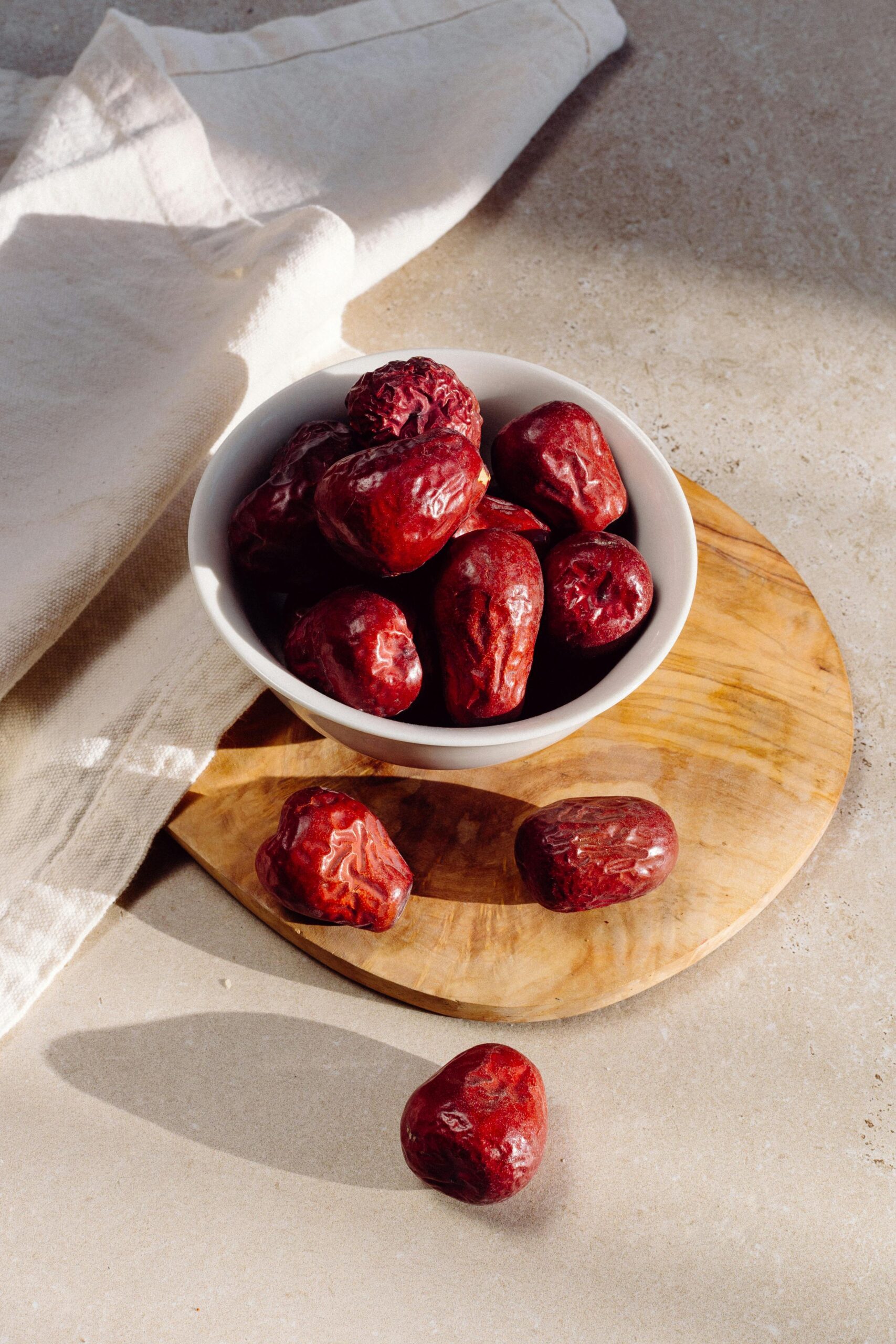In the final weeks of pregnancy, the body begins its quiet work of softening and preparing for birth. In Traditional Chinese Medicine, this stage is viewed as a crucial time to nourish and strengthen — to ensure that energy, or qi, and blood are abundant enough to support both the birthing process and recovery that follows. The focus is on restoring vitality, maintaining balance, and preparing the body to move through labour with steadiness and strength.
Among the foods and herbs used for this purpose, red dates hold a special place. They are considered one of the most restorative ingredients in the TCM diet, traditionally used to tonify the blood, replenish energy, and calm the spirit. Their natural sweetness makes them grounding and easy to digest, offering gentle nourishment without taxing the system.
Red dates can be used in teas, soups, or slow-simmered tonics to fortify the body in the weeks leading up to labour. In TCM, red dates are considered one of the most supportive foods for women during pregnancy and recovery. They are known for their ability to strengthen Qi (vital energy), nourish Blood, and support the Spleen and Stomach, which are the body’s key systems for digestion, energy production, and nutrient absorption.
During the later stages of pregnancy, a woman’s body directs much of its energy and blood toward the developing baby. Red dates are used to restore balance — to build strength gently and sustainably, while promoting overall harmony between energy, circulation, and digestion. They are known to offer:
- Tonifying Qi and Blood – Supporting healthy circulation and steady energy in preparation for labour.
- Harmonizing the Spleen and Stomach – Gently strengthening digestion and absorption to maintain stamina when energy demands are high.
- Calming the Spirit (Shen) – Their natural sweetness helps ease emotional fluctuations and promote restful sleep before birth.
- Supporting Tissue and Vessel Integrity – By nourishing Blood and Qi, red dates help maintain healthy elasticity and circulation, preparing the body for childbirth.
Why Red Dates are favoured in late pregnancy
In Traditional Chinese Medicine, red dates (Da Zao, 大枣) have been described for over two thousand years as a food that strengthens the body’s core and restores harmony to its systems. The Shen Nong Ben Cao Jing (《神农本草经》, Divine Farmer’s Classic of Materia Medica, ca. 200 CE) lists Da Zao among the superior class of medicinal foods — substances that “nourish life and do not harm.” It is said to “tonify the Spleen and Stomach, supplement Qi, and calm the Spirit,” capturing its role as a gentle tonic that supports both physical and emotional stability.
Later, the Ming-dynasty physician Li Shizhen expanded on this in the Ben Cao Gang Mu (《本草纲目》, Compendium of Materia Medica, 1596), writing that Da Zao “augments Qi, nourishes the Blood, soothes the mind, and harmonizes the hundred medicines.” These classical descriptions form the foundation for its use in late pregnancy, when Qi and Blood are heavily drawn upon to sustain the growing fetus.
As energy becomes more concentrated toward the baby, mothers may experience signs of Qi and Blood deficiency such as fatigue, dryness, restlessness, or a weakened digestive system. Within TCM theory, this reflects the Spleen and Stomach — the “root of postnatal Qi” — becoming strained. Da Zao enters these channels, strengthening their function and improving the transformation of food into vital substances that nourish both mother and child.
Its flavour is sweet and its nature neutral, aligning with the Earth element, which governs nourishment, stability, and balance. Sweetness in moderation is said to “relax tension, harmonize the middle, and replenish Qi,” qualities especially valued in the final month of pregnancy when the goal is to support endurance and calm rather than stimulation.
Da Zao has been part of tonifying formulas for centuries and remains integral to modern practice. It appears in the Chinese Pharmacopeia (2020 edition) and is still taught as a harmonizing herb in the Materia Medica curricula of TCM universities worldwide. In contemporary obstetric and postpartum care, it continues to feature in commonly prescribed decoctions such as Gui Pi Tang (Restore the Spleen Decoction), Shi Quan Da Bu Tang (All-Inclusive Great Tonifying Decoction), and Ba Zhen Tang (Eight Treasure Decoction) — all of which are used clinically to strengthen Qi and Blood in women recovering from or preparing for birth. Modern formula guides such as the Jing Fang Xin Bian (《经方新编》) and hospital formularies in China and Taiwan still list Da Zao as a harmonizing component in prenatal and postpartum tonics.
Its continued presence in both traditional and modern prescriptions underscores the same principle described in the classics: Da Zao tonifies without causing stagnation or internal heat. It nourishes gently, supports digestion, calms the Shen, and reinforces the actions of other ingredients without overwhelming the system.
For these reasons, red dates remain one of the most frequently recommended foods and decoction ingredients for women approaching labour. Their use today — in hospital pharmacies, TCM teaching clinics, and home kitchens alike — reflects an unbroken line of practice from antiquity to the present, centered on the belief that gentle, consistent nourishment is the strongest preparation for birth and recovery.
Nutritional profile of Red Dates
Modern analyses of red dates (Ziziphus jujuba) have helped explain why this fruit has been regarded as so restorative in Traditional Chinese Medicine. Beyond their naturally sweet taste, red dates contain a wide range of active compounds — including polysaccharides, flavonoids, triterpenoids, phenolic acids, vitamin C, and essential minerals.
| Key Compounds | Possible Role in Late Pregnancy |
|---|---|
| Polysaccharides | Modulate inflammation and support tissue repair, helping maintain healthy uterine and cervical tissue. (PMCID: PMC11807978) |
| Flavonoids & Phenolic Acids | Provide antioxidant protection that supports blood vessel health and tissue integrity. (ResearchGate, 2018) |
| Vitamin C | Supports collagen production, connective tissue flexibility, and iron absorption.(WebMD, 2024) |
| Minerals (K, Mg, Ca) | Aid uterine muscle tone, electrolyte balance, and energy metabolism. |
| Natural Sugars | Provide a steady, gentle source of energy during the fatigue-prone final trimester. |
How to incorporate Red Dates in diet
You can begin incorporating red dates once you reach the final month of pregnancy — typically around 36 to 37 weeks. Most women do well with about 5 to 7 dates a day, though it’s always best to adjust based on what feels right for your digestion and appetite.
There’s no single right way to enjoy them. Red dates blend easily into everyday meals and can be prepared in a few simple, comforting ways:
- Steep them in hot water for a naturally sweet, caffeine-free tea that soothes and hydrates.
- Add them to soups, stews, or congee for extra warmth and nourishment.
- Pair with goji berries or ginger to create a mild tonic that gently supports circulation and energy.
- Steam or soak them first if you prefer a softer texture for snacking.
Their mild, balanced nature makes red dates suitable for daily use — a small, nourishing ritual you can enjoy as your body prepares for birth.
The takeaway
In Traditional Chinese Medicine, food is more than nourishment — it’s part of how the body heals and prepares for change. They’re safe for most women, easy to include in daily meals, and can be enjoyed in many ways — from tea to soups or tonics.
So go ahead — snack, sip, and steep those dates. Your body (and your cervix!) just might thank you. And if you’d like some guidance on how to weave red dates (or other TCM practices) into your birth preparation, feel free to reach out — I’d be happy to chat and support you on your journey.





